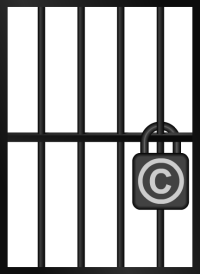 It was just a matter of time before some large-scale holder of copyright monopolies tried this in the U.S…
It was just a matter of time before some large-scale holder of copyright monopolies tried this in the U.S…
The American Chemical Society has asked a U.S. court to require Internet Service Providers (ISPs) to block access — that is, refuse to carry network traffic to and from — a site that the ACS claims is infringing its copyrights.
ISP-blocking is different, and worse, than domain seizure, and domain seizure for copyright infringement is already bad enough. ISP-blocking asks the court to step into new and dangerous territory, in which freedom of communications and the reliability of Internet infrastructure are degraded merely to provide another tool for enforcing a controversial and limited information monopoly. (It is by definition controversial — just ask yourself who are all those people whom the ISP block is intended to block? They must be people who do not agree with how copyright law restricts their access to this information.)
The ACS’s request is deeply wrong, in so many ways:
It ignores the principle and the spirit of common carrier status. ISPs are not supposed to be arbiters of acceptable comunication; they are not supposed to police content. Their job is to carry network traffic from one place to another. It does not take any great imagination to see why freedom of speech and of association depend on ISPs performing this job faithfully. This was also the point of granting them the “safe harbor” provisions in the U.S. Digital Millennium Copyright Act, and the EU’s “mere conduit” liability limitation in the Electronic Commerce Directive. These were smart boundaries to draw around ISP responsibility. The ACS’s request flies in the face of this principle.
It creates a moral hazard that attracts unscrupulous plaintiffs. If any time a complainant can get a court to agree that some site’s content is illegal, ISPs must block anyone’s access to that site, then we’ve thrown the door wide open for malicious plaintiffs seeking to use the legal system not only to harass their opponents, but to suppress even their ability to speak. It would bring SLAPP-style abuse to a whole new level.
It damages the entire Internet by blocking access indiscriminately. Suppose I happen to have an unauthorized copy of some copyrighted material, but you are authorized to have as many copies as you want. If you ask me for a copy, and I give you one, there is no (additional) crime: you are not infringing any copyrights, and I’m not infringing any more than I was already. But if I am blocked at the ISP level, then I cannot hand copies even to those who have every right to receive them. This is not merely theoretical. Suppose that the web site is operating in a country with different copyright laws from the U.S. When someone in the U.S. tries to access that site, neither the ACS nor the court nor the ISP has any clue whether that person is authorized to receive copies of the copyrighted papers they are trying to access. Maybe it’s a fully paid-up ACS member. Maybe it’s a student at a school that has signed an applicable agreement with the ACS. Maybe it’s one of the paper’s authors! You just don’t know. This is why ISP-level blocking is such a dangerous thing. It breaks Internet infrastructure for everyone equally.
It will involve collateral damage to unrelated sites. Most web sites are co-hosted on shared servers at commercial hosting providers. While law enforcement can target a site’s name, through domain seizure, to truly effectively block network access to the site’s server means also blocking access to the other, unrelated sites that just happen to use the same server (otherwise, the block is not too hard to get around). How would you feel about law enforcement sweeps that regularly capture not only the suspect, but also ten or so random bystanders who happen to be near her when she’s arrested? That’s what effective ISP blocking will do. Once again: it breaks Internet infrastructure in ways that affect everyone, not just the target.
It is incompatible with the ACS’s own mission. “To advance the broader chemistry enterprise and its practitioners for the benefit of Earth and its people.” Enough said.
As Stephen McLaughlin was quoted as saying in the Inside Higher Ed writeup: “The very idea makes my head spin. ISP blocking happens in the U.K., Germany and several other Western countries, but the U.S. simply doesn’t do that, to my knowledge.”
Yes, and let’s not start now.
